Princess Latifa urges UK police to reopen sister's kidnap case
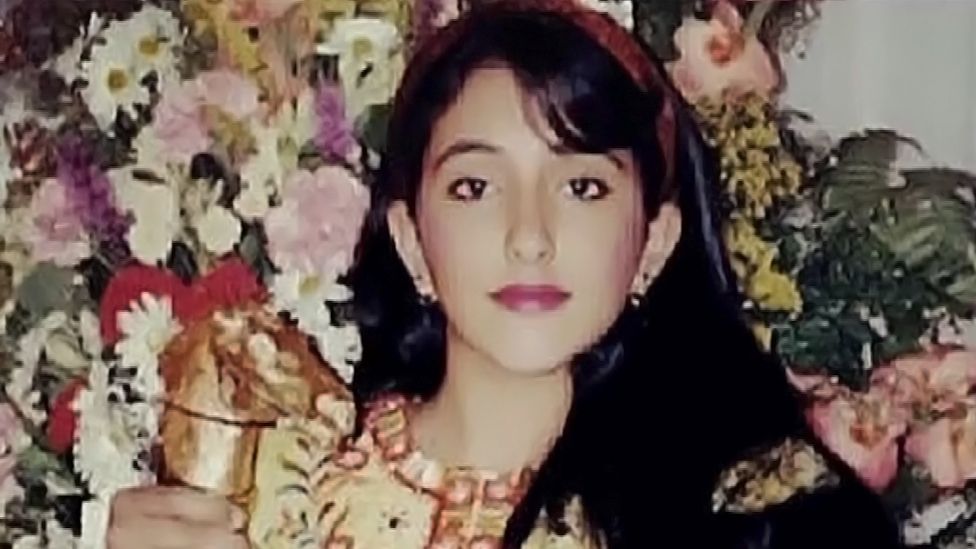 image copyrightSUPPLIED
image copyrightSUPPLIEDPrincess Latifa, the captive daughter of Dubai's ruler, has appealed to UK police to re-investigate the kidnap of her older sister from a Cambridge street more than 20 years ago.
In a letter shared with the BBC, Latifa tells Cambridgeshire police this could help free Princess Shamsa, who was captured on the orders of their father.
Shamsa, who was just 18 then and is now 39, has not been seen in public since.
The government of Dubai has not responded to BBC requests for comment.
A High Court judge ruled in 2019, that Sheikh Mohammed bin Rashid al Maktoum had abducted both daughters and held them against their will.
Last week BBC Panorama broadcast shocking videos Latifa had secretly recorded on a phone she had been given, in which she described how she was being held "hostage" by her father following a failed escape attempt in 2018. The UN has since asked the United Arab Emirates for proof that Latifa is alive.
But almost two decades earlier, an attempt by her older sister to flee the family also ended in capture and imprisonment.
In August 2000, around two months after escaping from her father's Longcross Estate in Surrey, Shamsa was forcibly taken from Cambridge, flown by helicopter to France and then by private jet back to Dubai.
Latifa's handwritten letter, which was passed to the Cambridgeshire force by her friends on Wednesday, urges action for her sister by British authorities. It was written in 2019 while she was being held in solitary confinement in a "jail villa".
"All I ask of you", writes Latifa, "is to please give attention on her case because it could get her her freedom... your help and attention on her case could free her."
She adds: "She has strong links to England… she really loves England, all of her fondest memories are of her time there."
Latifa dated the letter February 2018, before her escape attempt, to avoid revealing that she had a way of communicating with the outside world from captivity. It paints a chilling picture of her sister's fate after she was returned to Dubai.
"She was kept incommunicado with no release date, trial or charge. She was tortured by getting her feet caned..."
Cambridgeshire police first launched a kidnap investigation in 2001 after Shamsa made contact via an immigration lawyer. But the investigation eventually hit a dead end when officers were blocked from going to Dubai.
It later emerged that aides acting for the sheikh had made representations to the Foreign Office around the time of the investigation.
Police reviewed the investigation in 2018, and BBC News can now reveal that one investigator acknowledged there were "significant sensitivities" with the case.
A further review was launched after the High Court judgment was published in 2020.
In a statement to BBC News, Cambridgeshire Police said it had received Latifa's letter, which "will be looked at as part of the ongoing review".
The statement added: "This is a very complex and serious matter and as such there are details of the case that it would be inappropriate to discuss publicly."
The Foreign Office, which has previously faced questions over its response in the wake of representations from a powerful state ally, told the BBC this was a private matter between two individuals and it had no role in the investigation by Cambridgeshire Constabulary or its outcome.
They also declined to comment on contact from the sheikh's office regarding the case.
After the footage of Princess Latifa emerged, Foreign Secretary Dominic Raab said the footage was "deeply troubling" and that the UK would "watch very closely developments on that front".
In 2018, the Dubai Royal Court told the BBC that Shamsa was "adored and cherished".
The sheikh's only statement on the case has been to the High Court, and speaks of "relief" at having found his "vulnerable" daughter Shamsa after she went missing.
Shamsa's story prefigured what happened to Latifa 18 years later and played a key role in her decision to seek a new life abroad. It led directly to her failed escape on a boat in the Indian Ocean. In a video posted to YouTube before her attempt to escape in 2018 Latifa describes what happened to her sister and its severe repercussions.
BBC News has also spoken to someone who had regular contact with Shamsa in Dubai: "You didn't need to be a doctor to know that [she] was tranquilised all the time."
The failed escape of the young Shamsa
Princess Shamsa had grown up partly in the UK and had been given a Western education.
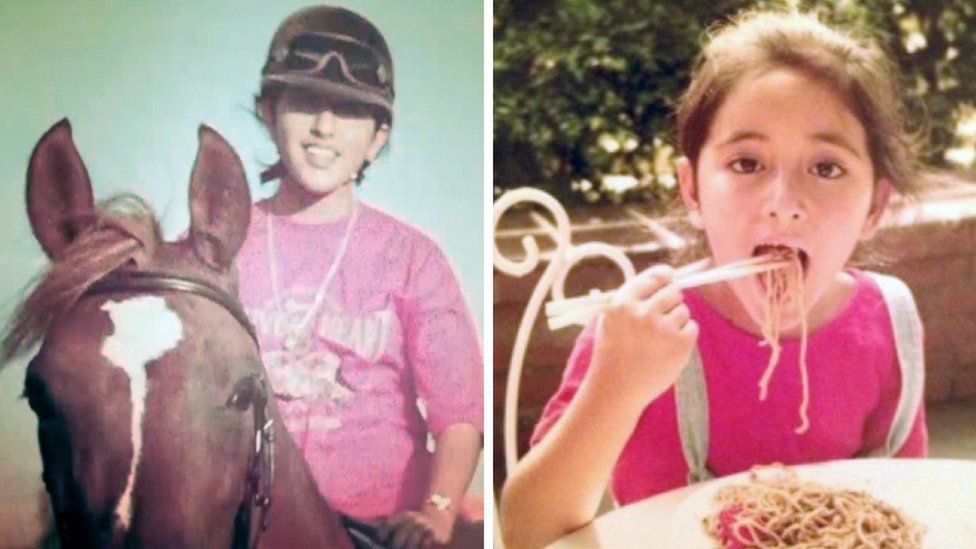 image copyrightSUPPLIED
image copyrightSUPPLIED"Shamsa wasn't what you would call a 'Princess'", according to her cousin Marcus Essabri, who lived with the family in Dubai for two years and was close to her. "She was cheeky. Full of life and adventure."
"She wanted to make a difference for women, in the Arab world especially. She wanted to push the boundaries… this is when the problems started," Mr Essabri said.
Shamsa wrote to Mr Essabri from London in September 1999, nine months before her escape. Her father, then Crown Prince of Dubai, was not letting her pursue her studies and go to university.
"I'm not allowed to continue. You know that he didn't even ask me what I was interested in. He just said no."
She confided in her cousin that she was thinking of running away.
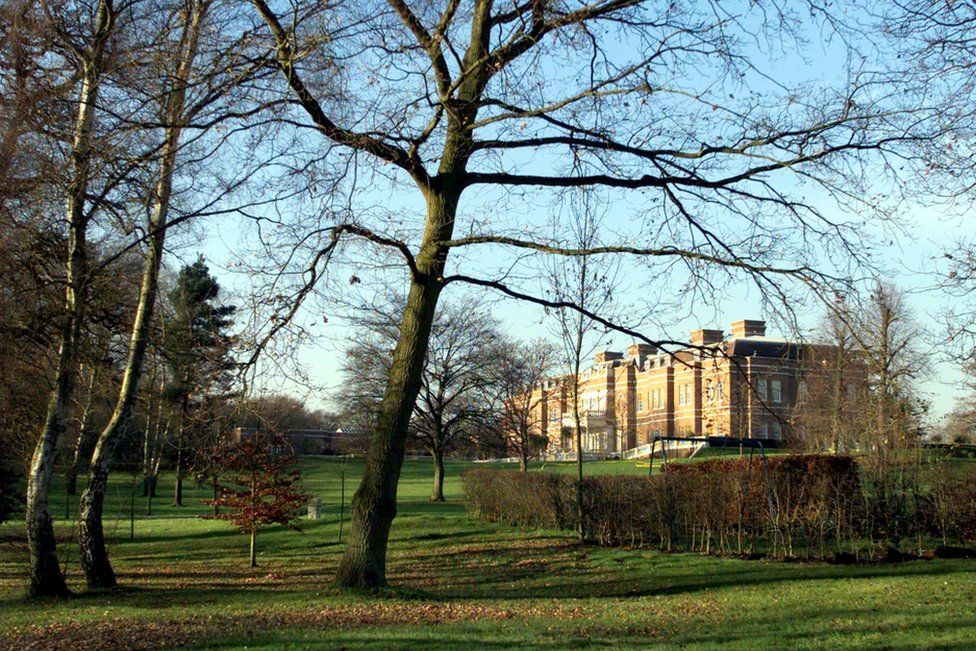 image copyrightFRANK BARON/The Guardian
image copyrightFRANK BARON/The Guardian"The one thing that scares me is imagining myself old and regretting not trying when I was 18. Try what? I don't know. Just taking that chance".
Then in summer 2000, she took it. She drove a black Range Rover to the edge of the sheikh's sprawling £75m estate at Longcross in Surrey and slipped away. The sheikh deployed a team of agents to secretly track her down.
On 19 August 2000, a man took Shamsa to Cambridge, where they checked into the University Arms Hotel. Unbeknownst to her, up to four of her father's operatives had arrived, and she was captured on the street.
Shamsa was driven to the sheikh's estate near Newmarket. By 0500 the next day, she was on a helicopter from Newmarket to northern France, where she was transferred to a private jet.
Hours later, she was back in Dubai: her dreams of freedom and of an education over.
How a British investigation stalled
It took around seven months for the kidnap allegation to reach Det Ch Insp David Beck at central Cambridge's Parkside Police Station.
"It's not every day that an allegation involving a head of state lands on a police officer's desk," he told the BBC in 2018 for the documentary Escape from Dubai.
Shamsa had managed to get a letter to the immigration lawyer she'd met while she was in London earlier: "I don't have the time to write in detail. I am being watched all the time so I'll get straight to the point. I was caught by my father, he managed to track me down. I am locked up until today… now, I am not only asking you to report this immediately, I am asking your help and to involve the authorities (involve everyone)."
"The evidence at that point suggested that there may be some substance to what was being alleged. If the allegation was true, then an offence appears to have been committed against a UK law," Det Ch Insp Beck told the BBC in 2018.
More details of the investigation were only revealed last year, when Cambridgeshire Police complied with a disclosure order from the High Court.
It emerged that he had managed to speak to Shamsa by phone, and then corroborated key details of her story. But he needed to go to Dubai to interview her and investigate further. He applied through the Crown Prosecution Service, but his request was rejected.
"I was never given a reason why."
The case was shelved, until a review in 2018 in the wake of yet another message from Shamsa. That was eventually closed because of "insufficient evidence to take any further action".
The sheikh did submit a statement to the High Court describing Shamsa as "more vulnerable than other young women of her age" because her status made her a kidnap risk.
Latifa's letter will represent the third time a plea has been made for police to investigate the abduction.
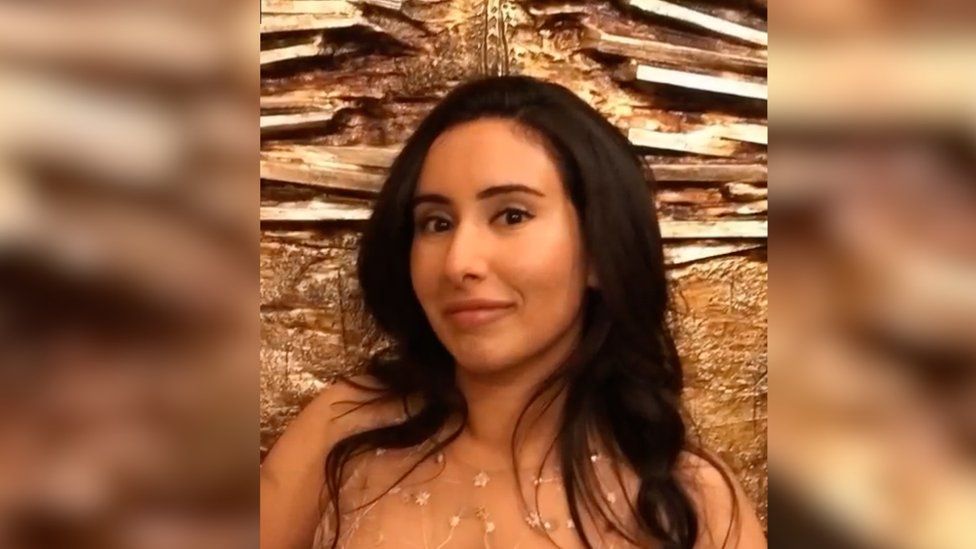
The sheikh's connections in the UK are deep. He is a friend of the Queen and one of the biggest private landowners in the country. Successive UK administrations have viewed the United Arab Emirates, of which Dubai is part, as a key strategic and business ally in the region.
In 2000 or 2001 the sheikh's London office contacted the Foreign Office about Shamsa's case. The FCO would later confirm in a Parliamentary answer that they had responded that it was a matter for the police. But inside the Foreign Office, BBC News understands that there was silence about the alleged abduction.
Tony Blair, then prime minister, told us through a spokesperson, that he has "absolutely no recollection of this coming to him in government".
In response to a BBC Freedom of Information request for any conversations held by the FCO relating to the case, we were told that "disclosure of information detailing our relationship with the UAE Government could potentially damage the bilateral relationship between the UK and UAE."
The 'zombie' life of Shamsa now
Latifa has said that Shamsa spent the eight years after her capture in prison.
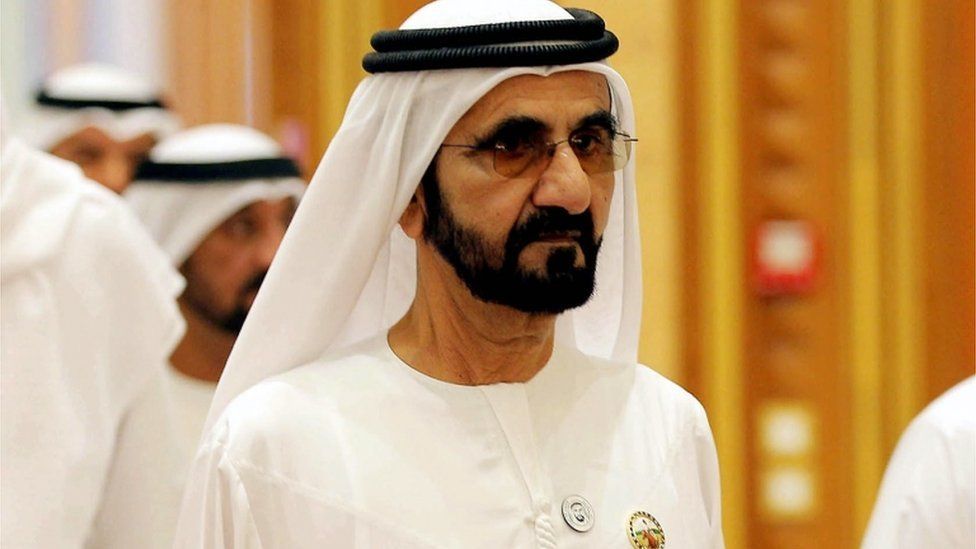 image copyrightEPA
image copyrightEPAWhen she was released in 2008, Latifa was able to see her. "She had to be led around by her hand. She couldn't open her eyes… she was given a bunch of pills to control her. Those pills made her like a zombie."
The person who had contact with Shamsa after her release said: "She was just…. kept quiet. Everything she did was controlled. There was no spark in Shamsa any more. There was no fight in her. There was nothing. She was just a shell."
"I think she just resigned herself to the fact that this was her life. It's desperately sad."
In 2019 Latifa met Shamsa again, by which time Latifa was imprisoned herself after also trying to escape. She described the meeting to her cousin via her secret phone.
"Latifa warned me 'you are not going to recognise her now'. She has been drugged up so much. She is alive. But Shamsa is not Shamsa", said Mr Essabri.
The person who has known Shamsa adds: "You couldn't actually make this up. Because who would believe you. It seems so unreal. But unfortunately, it's real. And I understand that people can't get their head round it, they just see some rich girl. It's not like that at all. It's horrific."




No comments